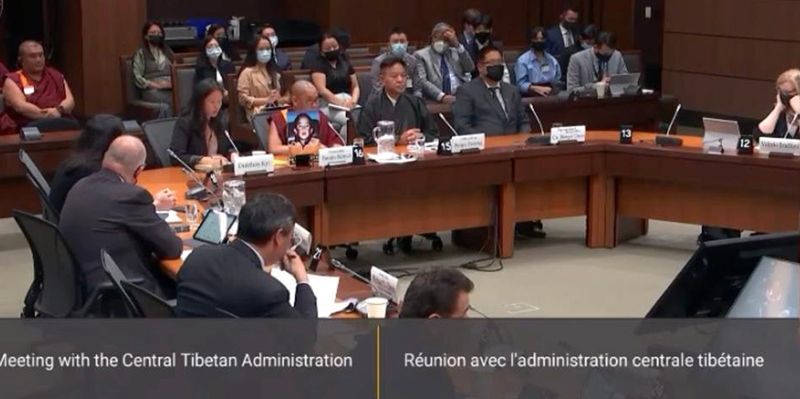Ottawa — Sikyong of the Central Tibetan Administration, testified before the Canadian House of Commons Standing Committee on Foreign Affairs and International Development on the crisis in Tibet and highlighted the dire political and human rights situation in Tibet under the Chinese government and the situation of the 11th Panchen Lama of Tibet.
Arif Virani, Member of the Canadian House of Commons, presented the Sikyong of the Central Tibetan Administration (CTA) to the Canadian House of Commons Standing Committee on Foreign Affairs and International Development on May 5, 2022.
In his testimony, Sikyong Penpa Tsering highlighted the critical political and human rights situation in Tibet under the Chinese government, as well as the repression of the Tibetan language and culture.
“When Xi Jinping came into power, the little freedom for language enjoyed by the Tibetans was demolished as he imposed One China Policy under which, there was no room for the practice of language and culture other than the Chinese language and culture. The schools and institutions have been forced to replace the medium of instruction from Tibetan to Chinese,” Sikyong said.
"Under Xi's presidency, things look dire and even the hope of negotiations in the immediate future seems remote," Sikyong said and urged the committee to pass a motion on resuming the Sino-Tibetan dialogue with unanimous consent.
Through his testimony, Sikyong was able to secure the support of the Canadian Parliament for a resolution for peaceful resolution of Tibet.
Zeekyab Rinpoche, the abbot of Tashi Lhunpo Monastery, made key statements on the case of Gendun Choekyi Nyima, the 11th Panchen Lama of Tibet, and also presented a five-point appeal to the commission hoping that it would consider the appeals positively.
The following is the five-point appeal presented by Zeekyab Rinpoche:
1. To pass a motion urging the Canadian government to mandate the ambassador to China, to meet with the 11th Panchen Lama and ascertain his whereabouts and wellbeing.
2. To honour the 11th Panchen Lama with an award recognising him as a victim of enforced disappearance for 27 years and as someone who has been denied his human rights, religious freedom, rights of a child and other fundamental rights of movement residency and action.
3. In order to enable his early release and as a way to draw attention to his situation, the Canadian parliament is appealed to observe the birthday of the 11th Panchen Lama.
4. To actively call for the release of Jadrel Rinpoche, a lama of Tashi Lhunpo monastery who was the head of the search committee for the 11th Panchen Lama as well as many other Tibetan political prisoners. On account of the dire situation in Tibet, Tibetans have been resorting to acts of self-immolations the latest being a 25-year-old Tibetan singer Tsewang Norbu on 25 February and 81-year-old Taphun on 27 March this year. At least 157 Tibetans have sacrificed their most cherished lives in order to draw the attention of the international community including the United Nations to the critical situation in Tibet. Therefore, the Canadian government is urged to respond positively to their pleas.
5. The aspiration of Tibetans in Tibet is for His Holiness the Dalai Lama to be able to return to Tibet at the earliest. The Canadian government is therefore appealed to consider taking a concrete initiative to support His Holiness the Dalai Lama and the Central Tibetan Administration to enable the resolution of the Sino-Tibet conflict through the mutually beneficial Middle Way Approach.


![Tibet has a rich history as a sovereign nation until the 1950s when it was invaded by China. [Photo: File]](/images/stories/Pics-2024/March/Tibet-Nation-1940s.jpg#joomlaImage://local-images/stories/Pics-2024/March/Tibet-Nation-1940s.jpg?width=1489&height=878)
















